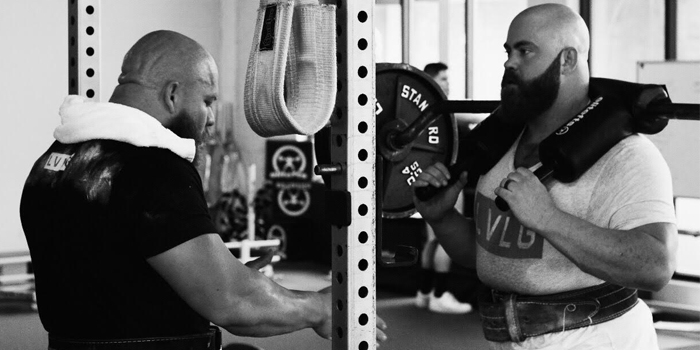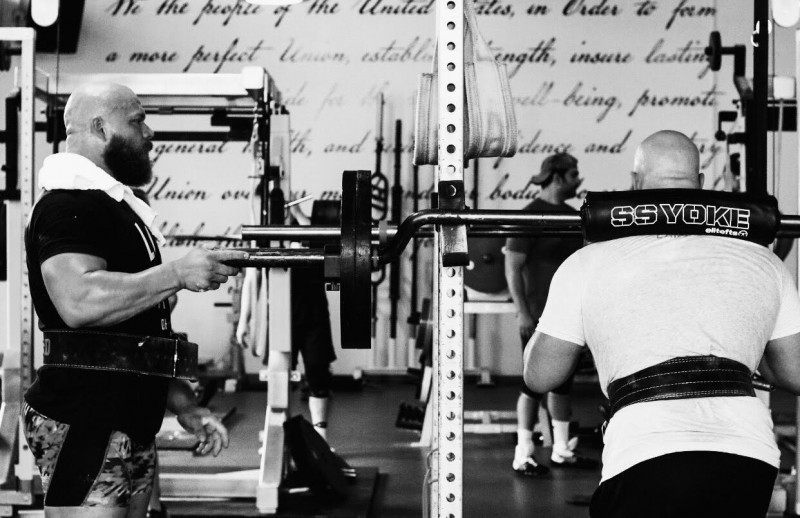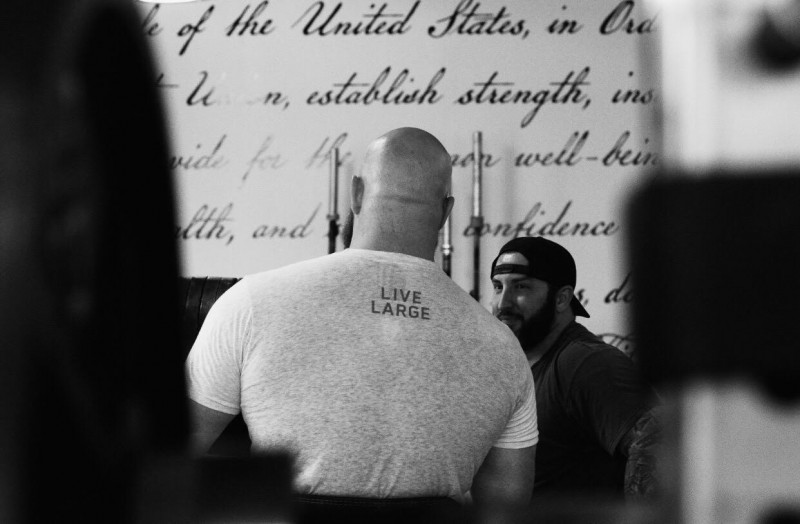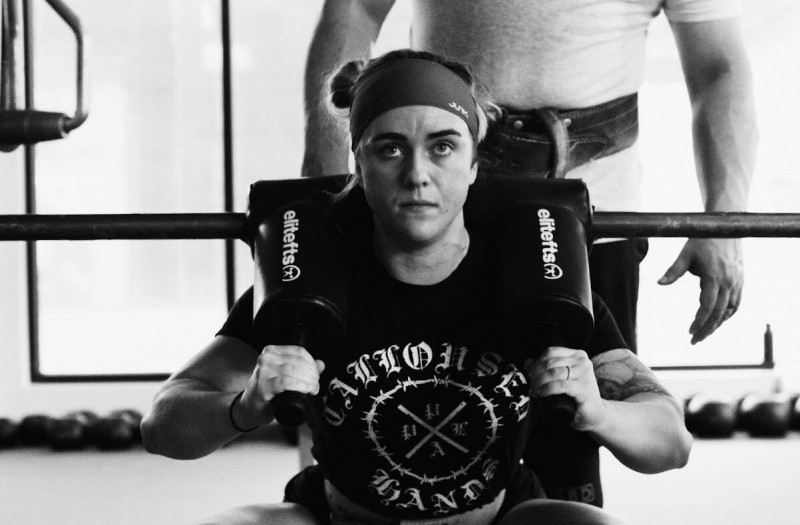
So, you’re a powerlifter. You’ve made the conscious decision to hire a coach to aid you in your journey in getting stronger. You are certainly not alone in your choice. As coaching becomes increasingly popular, more lifters have entertained the idea of having a coach for multiple reasons. If we look at the relationship between coach and lifter, what’s there for us to dissect and explore?
First, how do you know you’re making the right decision when seeking out a coach? I can’t say that I can line it out any better than Dave Tate does here.
WATCH: The One Thing That Makes a Great Coach
You find a coach you feel is the best choice, and you make an inquiry. It’s a good fit, and you compensate him or her. You’re a powerlifter with a coach now. You await your program to begin your journey under the guidance of your chosen coach.
Why is it that lifters choose to have coaches? There are many reasons lifters have come to me for help. I prefer to speak from my experience and to use examples I’ve encountered personally. So, I will share some of these reasons. These reasons include but are not limited to the following:
- Their strength has plateaued, and they need assistance.
- They simply don’t know what they’re doing.
- They’re new to powerlifting.
- They’re overwhelmed or confused.
- Their friends had positive experiences, and they were referred.
- They’re unhappy with their current coaches.
- They don’t have time to structure their own training.
- They want to walk into the gym and not have to think.
The list goes on. This list is only to open the door to the trajectory of this article. The main narrative I aim to discuss and open this article with is not centered on coach to lifter as much as it is lifter to coach.
What do you expect from a coach, as a lifter? I ask every potential lifter this before coaching him or her. Common answers include words and phrases such as encouragement, support, guidance, feedback, technique help, program design, help with getting stronger, and staying healthier.
It may be difficult to comprehend (or to think back, if you’ve been around for awhile), but a reality existed for a very long time where there were no online powerlifting coaches. The internet itself wasn’t nearly as popular within the sport of powerlifting as it is now. This, of course, aligns with the fact not so long ago, not everyone had a computer in his or her pocket, but I digress.
Now we have more powerlifting coaches than we do powerlifting meets. Why? Because there’s a growing market for it. I feel that this market has only started to begin to regulate itself. What I mean by this is that people are starting to see through the bullshit. But alas, within this business, as with any, the snake oil comes and goes. This oil burns hot and fast, but it doesn’t burn for long. Time is a true test of relevancy.
More individuals have chosen powerlifting in recent years. View it through whatever lens you please, but it is the reality. We have more powerlifters who are new to the sport. Now, more than ever, individuals need help. The knowledge base isn’t there for them, or isn’t there yet. Their trials have not yet been completed.
Trials are what make a coach unique. A lifter, as well. It is my opinion that the terms of “lifter” and “coach” should be synonymous. Your powerlifting coach should have some amount of time under a barbell to experience his or her own trials. Trials shape beliefs and values. Beliefs and values are what a coaching philosophy is born from. You can’t have trials without experience. So, a coach needs experience to have trials, to gain knowledge, to be able to be a competent coach, right? Right.
How do trials come to fruition, and how do they differ? I had a conversation with Casey Williams recently that resonated with me. It is applicable to what I aim to explore here. To quote Casey, “My muscular system is genetically superior. My digestive system is not genetically superior.” If you know two things about Casey, these are likely the two things: 1. He’s strong. 2. He battles with the chronic disease of ulcerative colitis.
Casey has his own trials. And he has his own coaching philosophy, which was developed upon those trials. Casey’s philosophy may be similar to mine. Our philosophies and beliefs regarding many ideas might be homogenous because our travels intersected at points. However, they are not identical. No two coaching philosophies are formed by travel on the exact same roads. Even if they were, our appraisal of our identical travel would vary based upon our personalities, beliefs, and cognitive processes.
There’s an even more relevant point that comes from this conversation that I wish to convey. Casey went on to explain that many people come to him wanting help with the bench press. He expressed that he did not understand why they were coming to him for help with the bench. I replied with something along the lines of, “Well, you have a great bench.” Casey replied, “Yeah, and I had a great bench in high school” and shrugged. But Casey overlooked something, as some more advanced lifters tend to do….
The majority of lifters asking for help haven’t realized that yet.
It makes logical sense to want bench press coaching from lifters with really good bench presses. But oftentimes it doesn’t simply boil down to that. The strong bencher may have always been a strong bencher. Now that certainly does not dismiss him or her. Casey’s reply to my smirk to his shrug was, “Find a lifter who couldn’t bench 135 in high school and benches 500 now. Hire them.”
The point here is that if you want help with increasing your bench press, you’re probably best off finding someone who’s had to work really, really hard for a good bench. Don't simply seek out the best bencher. The two aren’t always synonymous. This is how due diligence works when searching for a powerlifting coach. You’re not going to merge your business with another and not do any research beforehand, right? A well-dressed executive can hand you a piece of paper with nothing but the highlight reel, just as a coach can do via social media. It’s that company’s struggles and how that company recovered from them that truly tell the story of how they deal with adversity and problems. And in my opinion, that’s a lot of what coaching is.
This transitions to my next point. My favorite quote by Henry Rollins is, “Knowledge without mileage equals bullshit.” You may think I’m about to go on a tirade about how coaches need experience to learn and call themselves coaches, as mentioned beforehand. I believe that. However, I wish not to apply this quote to the coach as much as I do to the lifter. Enter my main, overarching point.
If you choose powerlifting (and stick with it), you’re going to be forced to think to move forward. There are exceptions to this. Genetic outliers, if you will. But chances are, those genetic outliers aren’t the ones reading this. I’m not writing for them, either. I’m writing for the lifter who is not especially gifted with superior muscular genetics. I write for the lifter who requires years upon years of work and much thought to continually improve.
It does not matter if you choose to have a coach or not. Critical thinking is necessary and imperative to improve for a long time. Critical thinking is your friend. It’s often a missing piece of a powerlifter’s cognitive tool kit. This type of thinking can develop either consciously or subconsciously. But it must develop for you to figure things out for yourself.
You should aim to be thinking by consciously paying attention to what’s going on within your training, as well as by expanding your own knowledge with (or without) a coach. Ideally, a coach will help you with this process and will uncover hidden pieces faster than if you were to be on your own. A coach should use his or her trials, experiences, lessons, errors, and successes to aid you in making better decisions. A coach’s job is to give you advice. What you do with that advice is most important.
Is the advice that you get from your coach going in one ear and out of the other? Have you had multiple coaches who have given you similar words of advice? Have you gone to seminars and taken little from them? Have you taken the words of experienced coaches or powerlifters and applied them? Eventually, you’re going to have to remove the training wheels and realize that no one can figure this stuff out for you. They can only help to accelerate the process.
Learning from trials and experience used to be the only way one could improve (and last for long periods of time) in powerlifting. Access to online coaches was non-existent when I started powerlifting in 2007. Articles and websites were helpful, but they weren't as individually based as they can be in 2018. I don’t know what things were like before 2007, but I can say pretty surely that I don’t think it was easier to find external resources for the generations that came before I started powerlifting.
Ten years ago, you could find a group of lifters who would welcome you in and teach you. If you were lucky, they were close. Many ended up driving to them. That, combined with the database of information on the website you are currently reading, was how I began to learn what I know now. These groups of lifters certainly weren’t sending me Excel spreadsheets with my exact numbers for each training day, or making every decision for me. They weren’t reviewing my videos from each training session and picking them apart. That was my job. They were yelling cues at me while a bar was on my back. They were showing me what to do by doing it. It was real and authentic. It lacked anything outside of what I needed to hear. If I was willing to invest the time and load a plate or two, it was free.
So, why even bring up previous generations? My aim is to bridge the wide gap between old and new as I stand between two generations of powerlifting. I learned from the older generation, and I attempt to apply old ways of thinking to a generation that generally thinks differently. The generations before us figured out a whole hell of a lot. The generations before us built the foundation on which we stand. The generation before is important to appreciate and learn from. The generation before us was forced to be smarter because its members didn’t have the amount of potential help that the current generation does. But that’s no surprise. It happens in almost any arena. Look at music. It’s almost never as good now as it used to be.
The generation before us had much less red tape to cut through than we have now. Its members didn’t have discount codes. They didn’t have hundreds of companies where their entire existence revolved around selling t-shirts and other eccentric articles of clothing to a powerlifting demographic. They didn’t have shameless self-promotion that seemed to have a continual limited number of spots left. It wasn’t a fashion show or a market that someone with some followers could gain monetary compensation from. Guys used to squat in the shirts that they wore to work that day. It’s a hard concept to grasp.
In a powerlifting reality, where we are smashed in the teeth with these things with every move our thumbs make, a reality once existed where one thing mattered: getting stronger. And more importantly, displaying that strength in a meet. Not in the gym. Not in front of our friends. And certainly not for social media. At a meet.
So how does this apply to coaching in 2018? I will put it very bluntly for you.
The lifter who chooses a coach and expects that coach to open the door and drive him or her to a better total while he or she sits and views the scenery is the lifter who wishes to sever his or her own Achilles’ heel. You can get strong yet have no idea how to get strong. Is that what you want? I would hope not. I hope that you wish to gain more from this sport than a total number. Don’t get out of the passenger seat at your next PR total. Get out of the driver’s seat knowing well how you got to your destination. It’ll help you to your next five totals and teach you a skill set that will surprise you on how well it can be applied in other areas of life.
The truth is, your coach doesn’t have all of the answers. If your coach tells you that he or she does, your coach is being dishonest. Your coach may have a more educated appraisal, hypothesis, or solution to a problem you run into. Your coach should be helping to direct you on the map with his or her notes and shortcuts while you hold the wheel of your own training. It is truly you who has control and who makes the final call with every decision. Some form of autoregulation is crucial with any training style or program.
As stated before, my aim is to bridge a gap between how things were, and how things are becoming. I wish to apply the lessons I’ve learned from an older generation to the parts of a new generation that need them most. As a coach, I don’t want to tell people EXACTLY what to do from the time they walk into the gym, to the time they walk out. Nor do I think I am capable of doing so. And to drive someone to a bigger total is doing them a complete and total disservice as stated before.
There are many lessons one can learn from powerlifting. Trials truly never end. And personally, the most valuable lessons I’ve learned from powerlifting have been learned on my own volition with the guidance of others whom I trusted, and who trusted me enough to invest time in me. Consequently enough, those lessons I’ve been able to apply to other areas of my life that are more valuable to me than the sport of powerlifting ever will be. I feel this is the most efficient way to approach having a powerlifting coach. Take advantage of the services that these coaches provide, but keep your hands on the wheel of your own training.
As always,
Have Calloused Hands
Lones Green
Lones Green resides in State College, Pennsylvania. Lones signed up for his first meet in November of 2007 and has lifted in nearly 20 powerlifting meets since. Lones has trained conjugate for over ten years and is the founder of Calloused Hands Powerlifting. Lones has best lifts of an 855-pound squat, 575-pound bench press, and 690-pound deadlift in the 308-pound and super heavyweight classes.
Images courtesy of Yessica Martinez













